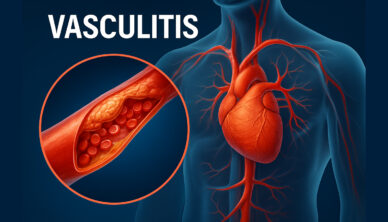Contents
Vasculitis

Royal Buckinghamshire Hospital | Neurorehabilitation & Complex Condition Experts
What is Vasculitis?
Vasculitis is an inflammation of the blood vessels that can affect arteries, veins, and capillaries throughout the body. The condition can cause blood vessels to thicken, narrow, or scar, restricting blood flow and potentially damaging organs and tissues. Vasculitis can be short-term or chronic and varies widely in severity.
Common Types of Vasculitis
There are many forms of vasculitis, including:
- Giant cell arteritis
- Granulomatosis with polyangiitis (Wegener’s)
- Microscopic polyangiitis
- Behçet’s disease
- Churg-Strauss syndrome (EGPA)
- Polyarteritis nodosa
- Takayasu’s arteritis
Symptoms of Vasculitis
Vasculitis symptoms depend on the organs affected and the severity of the inflammation. Common signs include:
- Fatigue and general malaise
- Unexplained weight loss
- Fever and night sweats
- Muscle and joint pain
- Numbness or weakness
- Skin rashes or ulcers
- Shortness of breath
- Kidney issues or blood in urine
- Headaches or vision problems (especially in temporal arteritis)
Causes and Risk Factors
The exact cause of vasculitis is often unknown, but contributing factors may include:
- Genetic predisposition
- Autoimmune disorders (e.g., lupus, rheumatoid arthritis)
- Infections such as hepatitis B or C
- Reactions to certain medications
Diagnosis of Vasculitis
Our consultants at Royal Buckinghamshire Hospital may use several tests to diagnose vasculitis, such as:
- Blood and urine tests to detect inflammation or organ involvement
- Biopsy of affected tissue
- Imaging scans like MRI or CT to assess internal inflammation
- Angiography to view blood vessels directly
Treatment for Vasculitis
Early treatment is vital in managing vasculitis and preventing complications. Treatment typically includes:
- Immunosuppressive medications, such as corticosteroids
- Biologic therapies for more severe or resistant cases
- Treatment of underlying causes, such as infections
- Rehabilitation support, particularly in cases affecting mobility or organ function
As a specialist neurorehabilitation and complex care facility, Royal Buckinghamshire Hospital offers:
- Expert Multidisciplinary Teams including neurologists, rheumatologists and rehab specialists
- Tailored Treatment Plans for managing systemic inflammation and recovery
- Inpatient & Outpatient Services depending on clinical need
- Comprehensive Rehabilitation for patients recovering from severe or long-term vasculitis impact
11 June 2025
